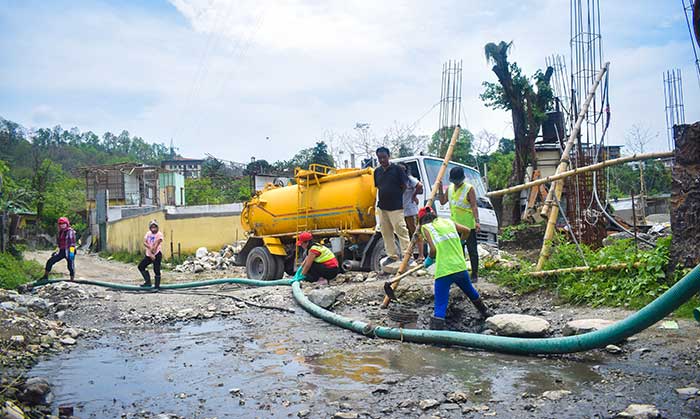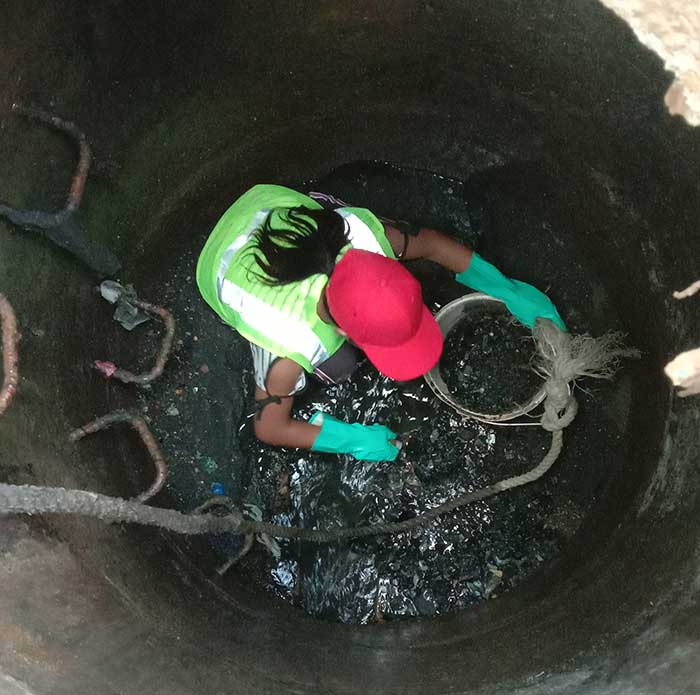Businesses from tailoring to automobile workshops are affected
Rajesh Rai | Phuentsholing
Former drayang employees, Dawa Dema and Chandra Kala said they cried after the first day of their new job. Having to work with city’s sewerage system was such a challenge.
Now, after many days, they look at the job differently. They do not cry anymore. In fact, they are proud of themselves.
Entertainment centres like drayangs and clubs are now closed due to the Covid-19 pandemic.

Former drayang employees clean up a manhole
Finding it difficult to pay house rent, Dawa Dema and her friends did not hesitate to take up the odd job. Seven of them, all women, are paid Nu 13,500 per month by thromde.
After the border gate was closed on March 23, service sectors in Phuentsholing started to feel the pinch.
In response to this situation, the labour office in Phuentsholing employed 213 Bhutanese, mostly jobless youth, in various labour intensive jobs.
The mini dry port and FCBL has employed youth to load and unload goods. About 22 former drayang employees are also involved in collecting parking fees. A few have taken haircutting.
Why non-Bhutanese?
Affordability, skills, and attitude are the three primary reasons why employers choose people from across the border.
Regional director with labour office, Sonam Tenzin, said non-Bhutanese were willing to work for smaller salaries.
From January to until today, more than 70 jobseekers have registered with the regional employment office.
According to the recently published Labour Force Survey (LFS) Report, 2019, unemployment is more of an urban phenomenon with 5.3 percent, which is three-times higher than that of rural areas (1.6 percent).
Post-Covid-19
This development, meanwhile, brings about a question, whether the Bhutanese employed amidst the Covid-19 pandemic, would still be in employment after the situation returns to normal.
A businessman, Sonam Tshewang, said that employing Bhutanese would mean the “capital” would remain within the country.
“This means there would be an overall economic benefit for the country.”
The regional secretary of BCCI in Phuentsholing, Sangay Dorji, said that the people ought to understand the importance of giving employment opportunities to Bhutanese, especially at this time.
Sectors that need skilled workers
Construction sector is pretty much in a comatose with skills and labour shortage. The sector needs more than 150 construction workers immediately.
A labour officer, Kelzang Tshechi, said there was more demand for mason and carpenters. “We get the helpers but not the skilled workers.”
A thromde engineer with the infrastructure division, Ashok Sunwar, said there were several projects that could not be continued.
Workshops too are struggling. One of the biggest and busiest workshops, Zimdra Automobile, is running short of more than 70 percent of skilled workers.
Due to the increasing number of clients, Zimdra has started to take prior appointments. The firm’s general manager said that customers were handicapped without their vehicles and demanded immediate services.
“We are trying our best,” he said.
He said that not many Bhutanese preferred working in workshops. Zimdra has employed some VTI graduates.
Wood-based industries are also facing the dearth of skilled labourers. Most shoe repair and tailoring shops are also closed.
It is uncertain when the border would open and if Bhutanese would continue to work or employers turn back to cheap hands from across the border.


